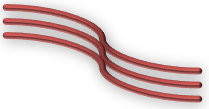 Split Text On Multiple Delimiters
Split Text On Multiple Delimiters
This page describes two functions that are logical extensions of the VBA SPLIT function to allow
splitting a character string using multiple delimiter characters and/or multiple-character delimiters.

With VBA Version 6 (Office 2000), Microsoft introduced the Split function, which
splits a text string into an array, using a delimiter character or characters to indicate the separation between
words in the input string. For example, Split("ab|cd","|") returns a two element array,
the first element being ab and the second being cd. The
| character indidates the character that separates the strings. While Split does support
mutliple character separator strings (e.g., Split("ab|$cd","|$") would return elements
ab and cd), using the character sequence |$
as the delimiter string, it does not support multiple delimiters. For example, you
cannot use Split to split apart the string ab|cd$ef%gh where |,
$, and % are all considered text delimiters. This page describes
two functions that expand on the VBA Split: SplitMultiDelims that allows
you to specify any number of single-character delimiters, and SplitMultiDelimsEX which allows
you to specify any number of single- or multiple-character delimiters. For example, you can split the string
"yesterdaySTOPtodayENDtomrrowNEXTfuture" into the array {yesterday, today, tomorrow, future} by
specifying STOP, END, and NEXT as the delimiter
words. Of course, the delimiters need not be actual words; they may be any series of strings of any characters.
You can download an example bas module here.

The SplitMultiDelims function is used to split a string into substrings using any of the supplied characters
as delimiters between the substrings. Substrings are separated by any one character passed in the
DelimChars characters. All delimiter characters are treated as single characters and no one
character has any higher priority than any other character. That is, the order in which the character appear in the DelimChars string is
irrelevant. The function returns an array of substrings parsed out from the Text parameter using the
characters in the DelimChars parameter. If Text is empty, the function
returns an unallocated array. If DelimChars is empty, the entire Text value
is returned as a single element array.

If Text contains a|bc$def:ghij, and DelimChars
contains the string :|$, the result is the array {a, bc, def, ghij}.
If Text does not contain any of the characters in DelimChars, the function
returns a single element array containing all of Text.

Function SplitMultiDelims(Text As String, DelimChars As String) As String()
Dim Pos1 As Long
Dim N As Long
Dim M As Long
Dim Arr() As String
Dim I As Long
If Len(Text) = 0 Then
Exit Function
End If
If DelimChars = vbNullString Then
SplitMultiDelims = Array(Text)
Exit Function
End If
ReDim Arr(1 To Len(Text))
I = 0
N = 0
Pos1 = 1
For N = 1 To Len(Text)
For M = 1 To Len(DelimChars)
If StrComp(Mid(Text, N, 1), Mid(DelimChars, M, 1), vbTextCompare) = 0 Then
I = I + 1
Arr(I) = Mid(Text, Pos1, N - Pos1)
Pos1 = N + 1
N = N + 1
End If
Next M
Next N
If Pos1 <= Len(Text) Then
I = I + 1
Arr(I) = Mid(Text, Pos1)
End If
ReDim Preserve Arr(1 To I)
SplitMultiDelims = Arr
End Function

The function SplitMultiDelimsEX function is an extension of the SplitMultiDelims
function. Instead of being restricted to single-character delimiters, it allows for any number of multi-character string delimiters.
These delimiters are passed in the DelimStrings parameter, and each delimiter string in this parameter is
separated by the DelimStringsSep character. The strings in DelimStrings must not
use the DelimStringsSep except as the string separator. The function returns an unallocated array
if Text is empty, the full contents of Text as a single element array if DelimStrings
is empty, or an array of 1 to many elements each of which is a substring of Text, separated by any string in the
DelimStrings. The elements of DelimStrings are treated equally. That is,
the order of the strings in DelimStrings is irrelevant.

The code below allows you to split one o rmore multiple-character delimiter
strings. The IgnoreDoubleDelmiters indicates what to do
when two delimters exist with no text between them. If this value is True, consecutive
delimiters are compressed to a single delimiter and the code behaves as if there was a single delimter. If this
value is False, consecutive delimiters would result in an empty element in the result
array.
Function SplitEx(ByVal InString As String, IgnoreDoubleDelmiters As Boolean, _
ParamArray Delims() As Variant) As String()
Dim Arr() As String
Dim Ndx As Long
Dim N As Long
If Len(InString) = 0 Then
SplitEx = Arr
Exit Function
End If
If IgnoreDoubleDelmiters = True Then
For Ndx = LBound(Delims) To UBound(Delims)
N = InStr(1, InString, Delims(Ndx) & Delims(Ndx), vbTextCompare)
Do Until N = 0
InString = Replace(InString, Delims(Ndx) & Delims(Ndx), Delims(Ndx))
N = InStr(1, InString, Delims(Ndx) & Delims(Ndx), vbTextCompare)
Loop
Next Ndx
End If
ReDim Arr(1 To Len(InString))
For Ndx = LBound(Delims) To UBound(Delims)
InString = Replace(InString, Delims(Ndx), Chr(1))
Next Ndx
Arr = Split(InString, Chr(1))
SplitEx = Arr
End Function
This allows mutiple delimiters of different lenghts. For example, to split on |, :: and
,, you would call the function like
Sub AAA()
Dim S As String
Dim T() As String
Dim N As Long
S = "this||is some::delimited,text"
T = SplitEx(S, True, "||", "::", ",")
For N = LBound(T) To UBound(T)
Debug.Print N, T(N)
Next N
End Sub�
You can download an example bas module here.
This page last updated: 20-September-2007